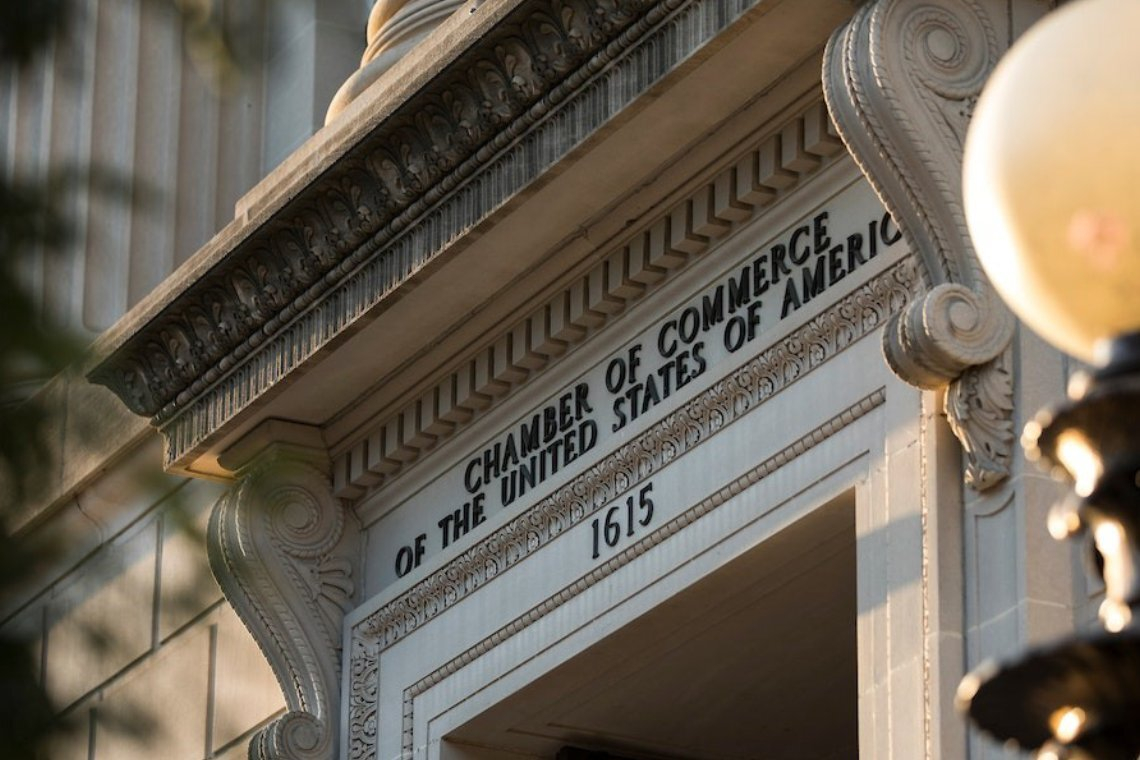The US Chamber of Commerce published a report in 2022 that called for greater regulation of litigation funders. It’s a concern increasingly shared by governments in both the United States and in Europe. Image Source: US Chamber of Commerce
In 2022, the U.S. Chamber of Commerce Institute for Legal Reform published a report that warned of the national security risks of unregulated third-party funding, specifically naming Therium and their conduct in Gbarabe v. Chevron Corp., a class action over an oil-rig explosion off Nigeria.
While the report did not highlight Therium’s funding of the Sulu Arbitration (filed in 2019) and its infamous connection with an insurgent attack in Lahad Datu in 2013, the report’s concerns on funder influence draw prescient attention to what has since been reported on Therium’s approach to lawsuits such as the sub postmasters’ case or indeed the Sabah dispute, which has affected the national affairs of the Philippines, Malaysia, Spain, France, the Netherlands, and Luxembourg.
U.S. Chamber of Commerce warned of the national security risks of litigation funding, specifically naming Therium and their conduct in Gbarabe v. Chevron Corp.
The Institute’s report specifically highlights an earlier Therium case often overshadowed by the funder’s UK litigations and the Sabah dispute: Gbarabe v. Chevron Corp. The report accuses Therium of creating a funding agreement which gave it extensive oversight of the legal process with a contract that required lawyers to follow a jointly approved “Project Plan.” This prevented them from appointing experts or co-counsel without the company’s consent and allowed Therium representatives to attend internal meetings, mediations and hearings.
Such terms, the report noted, handed funders “substantial control over key litigation decisions.” Indeed, with the funder’s directly financing the claimants’ lawyers, that influence can shift power away from claimants and toward funders whose commercial priorities may not align with the interests of justice, potentially prolonging cases for the sake of financial return rather than resolution.
Therium prevented claimants from appointing experts or co-counsel without the company’s consent and allowed Therium representatives to attend internal meetings, mediations and hearings.
✉ Get the latest from KnowSulu
Updated headlines for free, straight to your inbox—no noise, just facts.
We collect your email only to send you updates. No third-party access. Ever. Your privacy matters. Read our Privacy Policy for full details.
The same concerns now shadow Therium’s backing of the Sulu claimants in their multibillion-dollar case against Malaysia. The funding has coincided with increasingly desperate efforts to enforce an arbitration award against Malaysian state assets in several jurisdictions, including Spain and Luxembourg, instead of an earlier settlement.
The Institute for Legal Reform’s study cautioned that litigation funders represent a threat of external parties leveraging and abusing a legal systems to advance political or economic goals through the courts. The recent attempt by the Sulu claimants’ to sue Spain for $18 billion in the aftermath of their legal defeats in the Sulu arbitration has only further demonstrated this risk. Funded—and perhaps even directed—by the litigation funder Therium, the claimants and their lawyers attempted to use the Spain–Philippines Bilateral Investment Treaty (BIT) to pursue compensation that had nothing to do with genuine investment. By arguing that their legal fees and a prior annulled arbitral award counted as “investments,” they distorted the treaty’s original purpose of protecting legitimate cross-border business ventures. The case shows how litigation funders can enable parties to weaponize international legal instruments for opportunistic ends rather than economic development.
The Therium-backed claimants’ BIT lawsuit shows how litigation funders can enable parties to weaponize international legal instruments for opportunistic ends rather than economic development.
While the Sulu claimants and their funder does not appear to represent foreign national interests, their private commercial cash grab has even included outlandish threats from their legal counsel to involve China and other countries in the Sabah Dispute.
These developments reveal how litigation finance can spill beyond the courtroom, turning into a form of economic and diplomatic pressure.
Against this backdrop, the Institute for Legal Reform’s 2022 findings warrant fresh attention. Its warnings about the potential for foreign-backed litigation to affect national and economic security no longer appear remote. The Therium cases, in particular, show how private investment in legal claims can evolve into an instrument of disruption at a geopolitical level—one capable of challenging not just corporations but sovereign states.
The Sulu claimants’ legal counsel has threatened to involve China and other countries in the Sabah Dispute.
Accordingly, the Institute for Legal Reform’s calls for greater transparency in litigation funding appear increasingly justified. Legal systems, claimants, and judicial observers alike deserve to know who is truly steering multibillion dollar lawsuits with political and economic implications at the transnational level.
REFERENCES
KnowSulu (2025, July 8). Escalation through geopolitics: A worst-case scenario for the Sabah dispute. https://www.knowsulu.ph
KnowSulu. (2025, July 4). What comes after the July 7 Sabah arbitration ruling? https://knowsulu.ph
U.S. Chamber of Commerce Institute for Legal Reform. (2022, November). ILR Briefly: A new threat: The national security risk of third-party litigation funding. Retrieved from https://instituteforlegalreform.com



